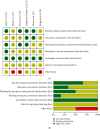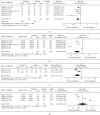Probiotics for Preventing Upper Respiratory Tract Infections in Adults: A Systematic Review and Meta-Analysis of Randomized Controlled Trials
- PMID: 33293995
- PMCID: PMC7718055
- DOI: 10.1155/2020/8734140
Probiotics for Preventing Upper Respiratory Tract Infections in Adults: A Systematic Review and Meta-Analysis of Randomized Controlled Trials
Abstract
Background: Upper respiratory tract infections (URTIs) are common and burdensome infectious illness. Several trials have reported that probiotics can prevent URTIs in adults.
Objectives: To evaluate the efficacy and safety of probiotics in the prevention of URTIs in adults.
Methods: PubMed, Web of Science, Embase, and Cochrane Library were searched for reports published from database inception to May 14, 2020. Randomized controlled trials (RCTs) comparing probiotics with placebo for the prevention of URTIs in adults were included.
Results: Six RCTs with 1551 participants were included. Compared with the placebo group, the probiotics intervention group significantly reduced the incidence of URTI episodes (RR: 0.77; 95% CI: 0.68 to 0.87; P < 0.0001; I 2 = 26%), the episode rate of URTIs (rate ratio: 0.72; 95% CI: 0.60 to 0.86; P = 0.0002; I 2 = 99%), and the mean duration of one episode of URTI (MD: -2.66; 95% CI: -4.79 to -0.54; P = 0.01; I 2 = 80%). The adverse events of probiotics were mainly mild gastrointestinal symptoms. There were no significant differences in occurrence rate of adverse effects between probiotics intervention and placebo group (rate ratio: 1.01; 95% CI: 0.80 to 1.26; P = 0.96; I 2 = 99%).
Conclusion: Low-quality evidence provides support that probiotics have potential efficacy for preventing URTI episodes in adults. More trials are required to confirm this conclusion.
Copyright © 2020 Laodong Li et al.
Conflict of interest statement
The authors declare that they have no conflicts of interest.
Figures



Similar articles
-
Cochrane Commentary: Probiotics For Prevention of Acute Upper Respiratory Infection.Explore (NY). 2015 Sep-Oct;11(5):418-20. doi: 10.1016/j.explore.2015.07.012. Epub 2015 Jul 6. Explore (NY). 2015. PMID: 26249739
-
Effect of vitamin D3 supplementation on upper respiratory tract infections in healthy adults: the VIDARIS randomized controlled trial.JAMA. 2012 Oct 3;308(13):1333-9. doi: 10.1001/jama.2012.12505. JAMA. 2012. PMID: 23032549 Clinical Trial.
-
Daily intake of fermented milk with Lactobacillus casei strain Shirota reduces the incidence and duration of upper respiratory tract infections in healthy middle-aged office workers.Eur J Nutr. 2017 Feb;56(1):45-53. doi: 10.1007/s00394-015-1056-1. Epub 2015 Sep 29. Eur J Nutr. 2017. PMID: 26419583 Free PMC article. Clinical Trial.
-
Effect of probiotic fermented dairy products on incidence of respiratory tract infections: a systematic review and meta-analysis of randomized clinical trials.Nutr J. 2021 Jun 28;20(1):61. doi: 10.1186/s12937-021-00718-0. Nutr J. 2021. PMID: 34183001 Free PMC article.
-
Role of probiotic as adjuvant in treating various infections: a systematic review and meta-analysis.BMC Infect Dis. 2024 May 21;24(1):505. doi: 10.1186/s12879-024-09259-3. BMC Infect Dis. 2024. PMID: 38773400 Free PMC article.
Cited by
-
Probiotics for preventing acute upper respiratory tract infections.Cochrane Database Syst Rev. 2022 Aug 24;8(8):CD006895. doi: 10.1002/14651858.CD006895.pub4. Cochrane Database Syst Rev. 2022. PMID: 36001877 Free PMC article.
-
Manipulation of the Upper Respiratory Microbiota to Reduce Incidence and Severity of Upper Respiratory Viral Infections: A Literature Review.Front Microbiol. 2021 Aug 27;12:713703. doi: 10.3389/fmicb.2021.713703. eCollection 2021. Front Microbiol. 2021. PMID: 34512591 Free PMC article. Review.
-
Probiotic supplementation for optimizing athletic performance: current evidence and future perspectives for microbiome-based strategies.Front Nutr. 2025 Jul 15;12:1572687. doi: 10.3389/fnut.2025.1572687. eCollection 2025. Front Nutr. 2025. PMID: 40735239 Free PMC article. Review.
-
The effect of bovine dairy products and their components on the incidence and natural history of infection: a systematic literature review.Nutr J. 2024 Feb 27;23(1):26. doi: 10.1186/s12937-024-00923-7. Nutr J. 2024. PMID: 38413931 Free PMC article.
-
Is There Evidence to Support Probiotic Use for Healthy People?Adv Nutr. 2024 Aug;15(8):100265. doi: 10.1016/j.advnut.2024.100265. Epub 2024 Jul 6. Adv Nutr. 2024. PMID: 38977065 Free PMC article. Review.
References
-
- Arroll B. Common cold. American Family Physician. 2011;84(12):1390–1391. - PubMed
-
- Disease GBD, Injury I, and Prevalence C. Global, regional, and national incidence, prevalence, and years lived with disability for 310 diseases and injuries, 1990–2015: a systematic analysis for the global burden of disease study 2015. Lancet. 2016;388(10053):1545–1602. doi: 10.1016/S0140-6736(16)31678-6. - DOI - PMC - PubMed
LinkOut - more resources
Full Text Sources

